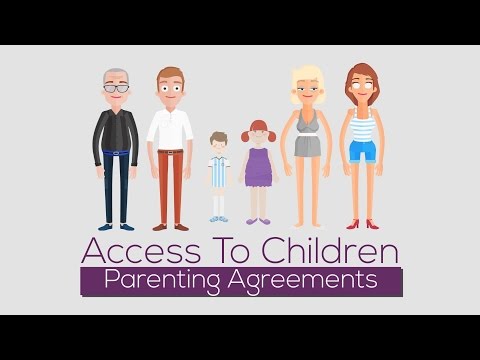
Access to children and parenting agreements in Australia Children who are supported and encouraged to maintain a relationship with parents, grandparents and other relatives, can adapt to the changing situation with greater ease Reaching an amicable agreement for access to children is not always possible, and in some situations a parent may need to apply to the Family Court or the Federal Circuit Court for Orders outlining parental responsibility and visitations
Parenting Plan verses Consent Order If the parents can agree on the care arrangements and access to children after divorce or the breakdown of a de-facto relationship, then a parenting plan should be made, or Consent Orders obtained Parenting plans are written agreements which are signed by both parents, and set out the agreed arrangements for access to the children This kind of agreement not only outlines each parent’s responsibility and rights, but can also include details of child support payments A parenting agreement is not a legally enforceable agreement, and is not to be confused with a Parenting Order made by the Court The requirements of a parenting plan are outlined in Section 63C of the Family Law Act 1975
A written agreement approved by the court is known as a Consent Order, and covers parenting arrangements, child maintenance and financial arrangements, if required This is a legally enforceable agreement, and holds the same weight as a Parenting Order made by the Court after a hearing Parenting plans are often entered into and drafted during a successful mediation; however, it is recommended that this agreement be transposed into a Consent Order, and filed and approved by the Court Applying to the Court for Access If you cannot agree on parenting arrangements, then you may need to apply to the Court to obtain a Parenting Order, outlining parental responsibilities and access Before doing so, you must have attempted mediation in the hope of reaching an agreement
A copy of a certificate from an accredited family dispute resolution centre must accompany the application The requirements of a Parenting Order and who may apply are outlined in Sections 64B of the Family Law Act 1975 A Parenting Order can deal with many issues including: who the child should live with; the time the child is to spend with the other parent; the allocation of parental responsibilities; how the child will communicate with the other parent; the payment of child support; and any aspect of the care, welfare or development of the child An application for a Parenting Order can also be made by Grandparents If your matter is complex then the application should be filed with the Family Court; however, all other applications should be filed with the Federal Circuit Court
Moving Away With Children If one parent is planning on moving away with the children and this is going to limit the time the other parent can spend with them, then a court may not give permission to do so The parent who is moving should consider applying to the Court, prior to the move, for a Relocation Order The court will consider what is in the best interests of the child before granting permission to move away from the other parent If the other parent wants to stop the move, then they can apply to the courts to prevent the relocation The costs involved in one parent needing to travel to visit their child or children, or vice versa, can be taken into account when assessing child support liabilities
Travelling Overseas With Children If a parent is planning to take their children overseas they need to get written permission from the other parent, even if the children already hold a passport If the child doesn’t hold a passport then both parents need to sign the Passport Application providing consent for the child to obtain one Providing consent for a passport does not mean the parent consents to international travel, and on each occasion permission needs to be obtained from the other parent If one parent won’t sign the application, then the other parent can write to the Department of Foreign Affairs and Trade, asking that they consider issuing a passport due to “special circumstances” If this fails, then an application to the Federal Circuit Court will have to be made for an Order allowing the child to travel internationally
If a parent is concerned that a child may be taken from Australia without permission, an application can be made to the Court for one of the following Orders: preventing a passport to be issued; requiring the passport to be delivered to the Court; or placing the child’s name on the AFP Airport Watch List, which prevents them from leaving the country Recovery Order If the child is not returned after a scheduled visit then an application can be made to the Federal Circuit Court for a Recovery Order under Section 67Q of the Family Law Act 1975 A Recovery Order can authorise a police officer to take appropriate action to find, recover and deliver a child to the persons named on the Order What to do next If you or someone you know is dealing with a family law concern it is important to obtain legal advice quickly Go To Court Lawyers operate a Legal Hotline on 1300 636 846 where you can talk direct to a lawyer 7am – midnight, 7 days/week
Your call will be treated with the strictest confidentiality and without judgement The lawyer will assess your matter and recommend a course of action Should you need a Court lawyer, even if it is at very short notice, the Legal Hotline staff will be able to arrange legal representation for you You can also request a call back via the website gotocourtcom
au and a lawyer will call you back to assess your matter




